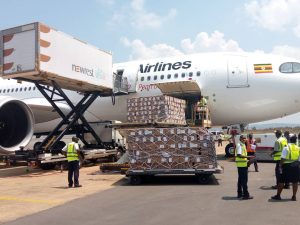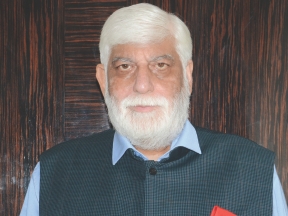Global air cargo tonnages continued to build in the final full week of January, ahead of Lunar New Year (LNY) on February 10, taking volumes for the last two weeks and for January as a whole well above their levels this time last year, according to the latest figures from WorldACD Market Data. “Preliminary figures for January as a whole show a 14 percent increase compared with January 2023, based on the more than 440,000 weekly transactions covered by WorldACD’s data, although the figures are skewed by LNY falling on January 22 last year with the week following LNY typically seeing a significant drop in tonnages ex-Asia Pacific. Nevertheless, there has been an underlying trend of higher year-on-year tonnages for several months, boosted by strong e-commerce traffic demand, ex-Asia Pacific since the final quarter (Q4) of last year and some limited conversion of sea freight to air and sea-air cargo in recent weeks due to the disruptions to container shipping in the Red Sea.”
Read More »Geodis sets new emissions reduction targets
Freight forwarder Geodis is targeting a 42% reduction in its own greenhouse gas emissions and a 30% reduction in subcontracted transport emissions. The company said that it would reduce its carbon emissions through the application of the Science Based Targets initiative (SBTi), in compliance with the goal of the Paris Agreement to limit global warming to 1.5° C. Geodis plans to continue the transition towards alternative vehicles and modes using carbon-free or bio-sourced energies and installing suitable infrastructures for refuelling and charging. Alongside the transition of its own fleet, the forwarder will utilise airlines and shipping firms that offer sustainable marine fuel and sustainable aviation fuel. This will support its customers in optimising their flows and implementing appropriate modal shifts, Geodis said. It will also look to drive efficiency through the utilisation of the latest generation of aircraft, ships and vehicles as well as optimised loading and itineraries.
Read More »CSMIA cargo throughput uplifted in 2023, with 12% YOY growth
Chhatrapati Shivaji Maharaj International Airport (CSMIA) announced total cargo handled in 2023 coupled with a 12% year-on-year growth in the total number of cargo ATMs demonstrates a solid pattern of growth, cementing CSMIA as a key enabler to the global supply chain. This accomplishment reflects the airport’s ongoing commitment to handling increasing volumes with efficiency and versatility. Pharmaceuticals, engineering goods, automobiles, e-commerce, and perishables comprise of major types of goods handled by CSMIA’s cargo facility. Among the vast range of products transported on the international fronts, the top three categories encompass automobiles, pharmaceuticals, and agricultural cargo. Whereas the domestic front saw top cargo categories as consol cargo, pharmaceuticals, e-commerce, and post office (PO) mail. These categories reflect the airport’s proficiency in handling a diverse range of goods. Notably, CSMIA experienced a 12% year-on-year growth in the total number of ATMs concerning air cargo operations. The e-commerce boom significantly influenced cargo operations at CSMIA. The festive season of 2023 registered 87% YOY growth of e-commerce shipments. The demand for perishable items has also witnessed a significant uptick. Export Mangoes achieved a record-breaking volume of 4,700 metric tons, demonstrating a remarkable year-over-year growth of 318%. Additionally, overall agricultural products have experienced a notable year-over-year growth of 44%. In a groundbreaking feat, CSMIA also successfully managed its inaugural consignment of frozen ready-to-serve food products, such as Idli and Vada, through specialized va-Q-tec containers to Amsterdam. The international cargo volumes handled by CSMIA showcased a composition with 55% representing exports and 45% representing imports. Globally, London, Frankfurt, Dubai, Chicago, and Amsterdam emerged as the top 5 International destinations receiving cargo from CSMIA, while on the domestic front, Delhi, Bangalore, Chennai, Kolkata, and Ahmedabad held …
Read More »Cathay Cargo Terminal goes fully digital on import collection
Cathay Cargo Terminal (CCT) has become the “first” Hong Kong cargo terminal operator to provide end-to-end digitalised import collection. Forwarders at CCT now have access to Electronic Shipment Release Forms (eSRF) which were created to offer a faster and more efficient service. The eSRF functionality speeds up the entire import collection process, providing improved efficiency and enabling freight forwarders to plan their work schedule with more flexibility,” said Cathay Pacific “Additionally, eSRFs are more secure than paper/manual identification verification, provide more visibility for customers and eliminate paper Shipment Release Forms (SRF), reducing archiving storage for freight agents and contributing to a more sustainable future.” Previously, freight forwarders could only obtain SRFs by undergoing authentication with paper-based identification documents and queuing for truck dock and cargo clearances. Under the new process, an eSRF can be issued through electronic authentication. Airlines can issue the eSRF to freight forwarders or consignees for pre-registration, automatic truck dock allocation, and online queuing for cargo clearance. With the inspection confirmation being recorded electronically, a cargo release confirmation will be shown on the mobile device.
Read More »IATA updates industry manuals for cargo and ground handling
IATA has updated its industry manuals for cargo and ground-handling operations, with more than 300 updates made. Some of the major changes in terms of cargo include those made to regulations related to live animals, perishable cargo, temperature-controlled cargo, operational risk assesment, and ground handling training and procedures. The annual update is undertaken by various industry working groups such as the Dangerous Goods Board (DGB) and the Live Animals and Perishables Board (LAPB). “Each working group is comprised of IATA and other respective industry experts who work with local governments and industry stakeholders, ensuring that each manual contains the most updated information on the latest regulations, trends, and best practices,” IATA said. The airline association’s senior vice president of commercial products and services Frederic Leger said: “Operating to global standards is a must in aviation. Devising these standards together with member airlines and other key value chain stakeholders has been the hallmark of IATA’s activities since its founding. “A great example of this is the Live Animal Regulations which sees its 50th edition published in 2024. Taking into consideration the various trends – especially sustainability and digitalisation – more than 300 changes are reflected in the 2024 IATA manuals, a testament to the fact that this work is essential to maintain a reliable and safe aviation ecosystem for both customers and employees.”
Read More »International air cargo service launched at Bhubaneswar Airport
The air cargo service was launched at Biju Patnaik International Airport (BPIA) in Bhubaneswar.On the first day of the air cargo service, 100 kg of cashew nuts, which were exported through Kolkata airport, were sent to Dubai and products of Jidal Steel to Sweden from BPIA. Minister of MSME and Energy Pratap Keshari Deb said in reports, with launch of air cargo service at Bhubaneswar, the businessmen of the state will no more have to depend on other airports like Visakhapatnam, Chennai and Kolkata. “Now they can export and import the products directly to destination countries through BPIA and thus avoid delay due to various reasons and extra charges towards handling fees. In case of any delay, it can be sorted out easily and faster,” he said. Stating that Odisha has enough scope for availing the air cargo service, Deb said, “Various farm, metals, mineral, handicraft, handloom, horticulture, marine and pharmaceutical products will be exported through BPIA.” The air cargo service, which has been put in place at a cost of Rs 2 crore, has been facilitated by direct flight service to Singapore, Dubai and Bangkok from Bhubaneswar airport, he added. Saswat Mishra, special secretary, MSME department, said despite COVID pandemic, 56% of transportation of goods from Odisha were made through air cargo service. Usha Padhee, principal secretary, Commerce and Transport department said while Indigo handles 210 ton of cargo everyday, it can provide support to transport at least 30% of goods from the state.
Read More »Delta Cargo launches e-commerce solution DeliverDirect
Delta Cargo announced the launch of its new product DeliverDirect, developed in collaboration with SmartKargo. “DeliverDirect is a door-to-door delivery service for the U.S. market, offering a competitive and customisable solution for e-commerce retailers seeking to optimise their direct-to-consumer shipping solutions,” says an official release from Delta Cargo. “With DeliverDirect, Delta Cargo pioneers an innovative domestic carrier approach, providing swift service with transparent pricing for e-commerce and small parcel delivery. From initial warehouse pickup to delivery at the end consumer’s doorstep, DeliverDirect is a fast, seamless, end-to-end service that upgrades traditional ground or air shipping services utilised by most current e-tailers. Small package shippers will benefit from increased shipping speeds, an uncomplicated pricing structure, proactive alert management, transparent tracking and reporting, and access to Delta’s vast domestic network.”
Read More »‘More airports in Tier 2&3 cities, new rail corridors, infra, exports on rise’
With the focus on making India ‘Viksit Bharat’ by 2047, Finance Minister Nirmala Sitharaman presented the interim budget and said, “Tier 2 and Tier 3 cities will have more airports,, there will be 11% increase in overall infrastructure expenditure. Exports will be doubled to ₹1-lakh crore rupees, measures will be taken to expand India’s railway infra, three major railway economic corridors including energy, mineral and cement corridor, a port connectivity corridor and a high traffic density corridor, were announced. “Railway projects have been identified under the PM Gati Shakti Yojana for enabling multi-modal connectivity. These will improve logistics efficiency and reduce costs. Decongestion of high traffic corridors will result in improving operations, which in turn would result in safety and higher travel speeds for passengers. These corridors, along with dedicated freight corridors, will accelerate our GDP and reduce logistic costs. Finance Minister also said that the government is focused on more comprehensive ‘governance, development, performance’ – termed as ‘GDP’. Finance Minister announced, “We have taken a number of steps in Customs to facilitate international trade. As a result, the import release time declined by 47 per cent to 71 hours at Inland Container Depots, by 28 per cent to 44 hours at air cargo complexes and by 27 per cent to 85 hours at seaports, over the last four years since 2019, when the National Time Release Studies were first started,” she added. Also, By unifying the tax system, she said, “The GST has reduced the compliance burden on trade and industry. As per a recent survey, 94% of industry leaders view the transition to GST as largely positive. She adds that the biggest beneficiary is the consumer as reduction …
Read More »‘Further improvements can be done in reducing transit time’
Vipin Vohra, Chairman, Continental Carriers said, “Finance Minister, Nirmala Sitharaman has announced that the government has implemented various measures to streamline international trade processes. Consequently, the time required for the release of import cargo has witnessed significant reductions. Specifically, there has been a 47% decrease to 71 hours at Inland Container Depots (ICDs), a 28% reduction to 44 hours at Air Cargo Terminals, and a 27% decline to 85 hours at seaports over the past four years, starting from 2019 when the National Time Release Studies were initially conducted. In light of these achievements, the Continental Carriers Pvt Ltd (CCPL) expresses the view that further improvements can be made in reducing release times. CCPL suggests that encouraging the establishment and utilization of off-airport bonded warehouses, particularly in the form of Air Freight Stations, would alleviate congestion at Air Cargo Terminals. Furthermore, CCPL emphasizes the potential benefits of rationalizing Cargo Handling tariffs by Cargo Terminal Operators. This, in turn, is expected to contribute to an overall reduction in logistics costs. Additionally, CCPL recommends the simplification of regulatory norms and the adoption of a ‘single window’ procedure for obtaining approvals. These measures are believed to enhance the development of world-class infrastructure for handling international cargo at Inland Container Depots, Air Cargo Terminals, and other relevant facilities.”
Read More »‘Development of three economic railway corridors is a transformative move’
Amit Maheshwari, CEO, Softlink Global shares his views on the interim budget 2024-2025, “The focus on enhancing logistics and intermodal transportation through the PM Gati Shakti plan, particularly the development of three major economic railway corridors, is a transformative move. This will significantly boost logistics efficiency and reduce operational costs, aligning perfectly with Softlink Global’s commitment to innovative and efficient logistics solutions. Additionally, the establishment of a one lakh crore rupee corpus for interest-free loans to support innovation is a commendable step. It will empower the private sector in advancing research and development, particularly in emerging technologies and defense sectors, resonating with our focus on integrating cutting-edge technology in logistics. Furthermore, the government’s initiative for green growth through bio-manufacturing and bio-foundry is another area we welcome. This move towards sustainable and eco-friendly manufacturing practices reflects a global shift towards environmental responsibility, an aspect critically important in the logistics and supply chain sector. These initiatives collectively represent a significant advancement in technology, logistics, and sustainable practices, and offer immense potential for companies like Softlink Global to innovate and contribute towards a more efficient and sustainable future in India’s logistics landscape.”
Read More » Cargo Breaking News
Cargo Breaking News








